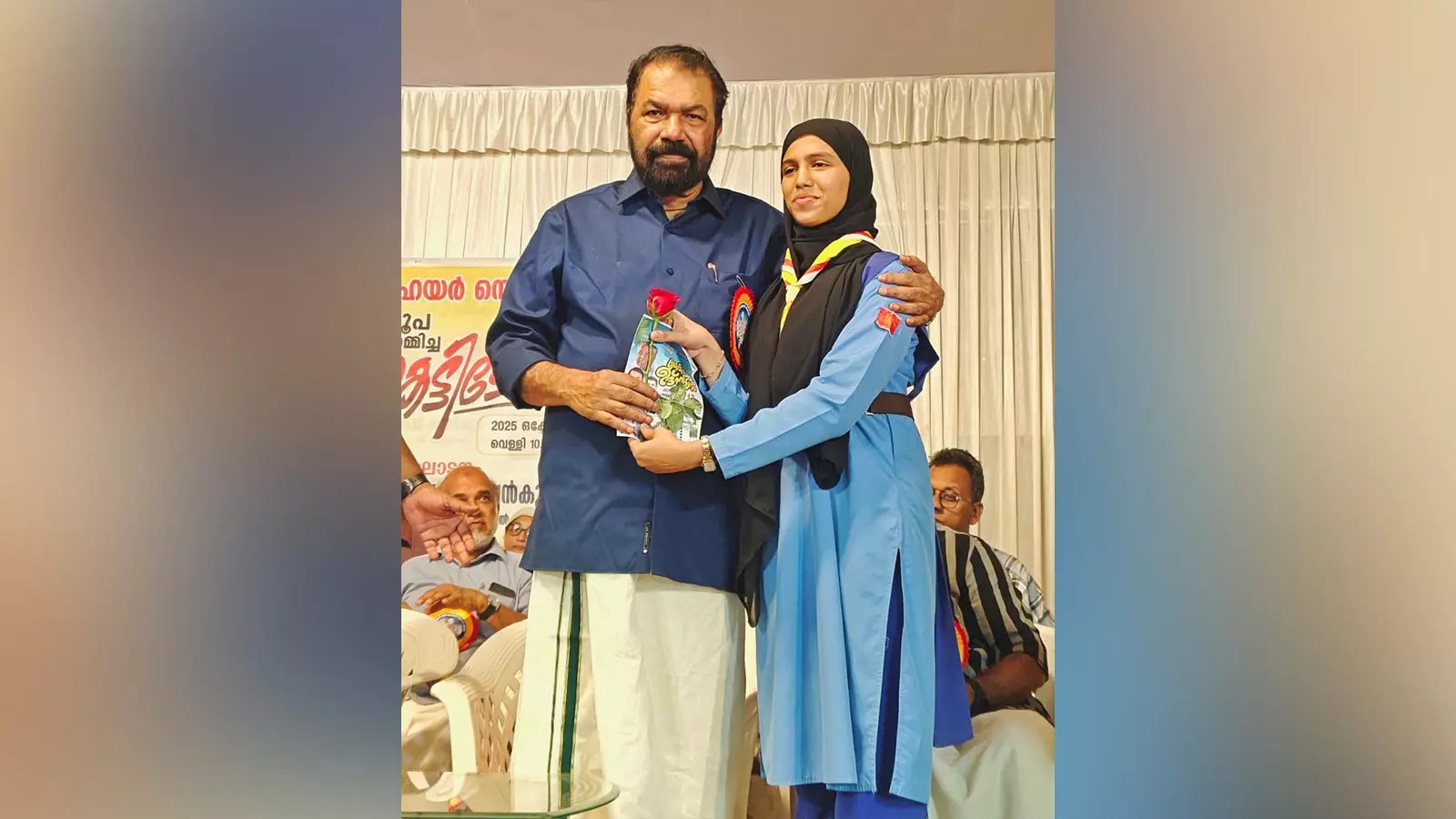
Kerala Education Minister V Sivankutty with a hijab-wearing student. Photo: V Sivankutty Facebook account
Hijab row: Kerala government backs students' rights but questions remain
State Education Minister V Sivankutty takes on school authorities; Congress, BJP, and SDPI react as controversy exposes secular tension

Amid the hijab row in a Catholic church-run school in Kerala which saw a Class 8 student leaving the institution after seeking to wear the religious headscarf inside her classroom, the education minister of the state, V Sivankutty, has posted a photograph on Facebook showing him affectionately embracing a hijab-clad student, with the caption: “Embracing children has always been a tradition in Kerala”.
The Communist Party of India (Marxist) leader’s position over the row at St Rita’s High School in Palluruthy, Kochi, has been clear from the beginning: The government would uphold constitutional protections and Kerala’s secular ethos, thereby ensuring the student’s right to religious expression.
Also read: Kerala girl leaves school after hijab row despite govt support; father says she was under stress
'Those responsible will be answerable'
“Those responsible for her departure will have to answer. It’s ironic that a teacher who wears a headscarf herself told the child not to,” Sivankutty said, adding the matter could have been handled respectfully and emphasised that the government would safeguard the rights of every student, even if it meant addressing a single case.
The controversy began when the student attended the school wearing a hijab. School authorities reportedly objected, citing uniform regulations. There were claims that she had at times been denied entry to classrooms, prompting her family to approach the state’s education department.
Officials conducted an inquiry and concluded that there were no rules barring the hijab and that the student’s rights under Articles 14 and 25 of the Constitution — equality before the law and freedom of religion, respectively — were non-negotiable.
Also read: Kerala hijab row: Church-run school to move high court against DDE report
Student's plight continued despite govt support
However, despite the government’s support, the student reportedly faced an unfavourable situation in the school. Her father, Anas, wrote on Facebook that she had been under severe mental stress.
“The state government and education department responded positively. But the school’s reaction was disappointing. Some teachers, including nuns who wear similar attire, told my daughter that the hijab might scare other students. That remark broke her spirit, and we did not want her to continue in such a situation,” he said.
The student’s family subsequently decided to transfer her to another school to ensure her well-being.
Also read: Kerala school challenges govt order in hijab row; minister softens stance
The school management maintained that its position was based on institutional policy rather than religion.
Officials cited the need for uniformity and discipline, but their refusal to accommodate the student even after government directives suggested an underlying discomfort with visible expressions of Muslim identity.
Teachers reportedly expressed concern that allowing the hijab could lead to similar demands from other students, framing the issue as a disruption to tradition and classroom harmony.
Also read: Hijab row forces Kerala school to declare two-day holiday
The government response was firm and measured. The education department’s report concluded that the school’s actions amounted to discrimination.
Other parties join the party
The Congress, which was among the first to broker a compromise between the school management and the students’ family with state MP Hibi Eden and other leaders, called for a conciliation. Reports indicated that the party leaders had convinced the family to comply with the school’s guidelines, which would have required the student to attend classes without her hijab.
Also read: Deepika Padukone in hijab for Abu Dhabi ad sparks 'fake feminist' row
“Their approach blurred the distinction between a student’s constitutional right and the school’s administrative preferences, effectively siding with the management,” said a local government official.
The Bharatiya Janata Party (BJP) framed the controversy as an example of and growing radicalisation of Muslim students and appeasement politics of the secular parties, portraying the incident as part of a broader narrative of minority assertion in public spaces. They have been focusing on the involvement of Islamic organisations, especially the Social Democratic Party of India (SDPI) — the political arm of the proscribed Popular Front of India in the matter.
Also read: Karnataka govt withholds award to college principal over anti-hijab stand
Deepika, widely regarded as the mouthpiece of the Catholic Church, and Suprabhatham, run by Samastha Kerala Jam’iyyathul Ulama, a faction of Sunni Muslims, reflected the sharp ideological divide in media coverage.
It accused a particular community of playing victim card and called out the government for appeasement.
In contrast, Suprabhatham praised minister Sivankutty for his firm constitutional stance, highlighting his commitment to secular principles and the protection of individual rights.
“Both communal sides can now rejoice, having effectively removed a girl from her learning environment. She may continue her studies in religiously affiliated institutions that accommodate her faith, but what the school and opportunistic communal politicians have done is turn a school matter into a question of religion, which is deeply troubling,” said Agnes Ignatius, a concerned parent in Palluruthy.
Also read: After hijab ban, Mumbai college bars students from wearing T-shirts, torn jeans
“In the first place, she could have continued wearing her headscarf peacefully, as I saw when I studied in a convent school and my Muslim classmate wore a 'Thattom' (headscarf) every day without any fuss. Here, the school management and the people who created the ruckus are both at fault,” she added.
The controversy exposed the complex dynamics of Kerala’s aided schools, many of which are managed by religious bodies but receive state funding. These hybrid institutions constantly navigate competing pressures, upholding institutional authority while adhering to constitutional freedoms.

